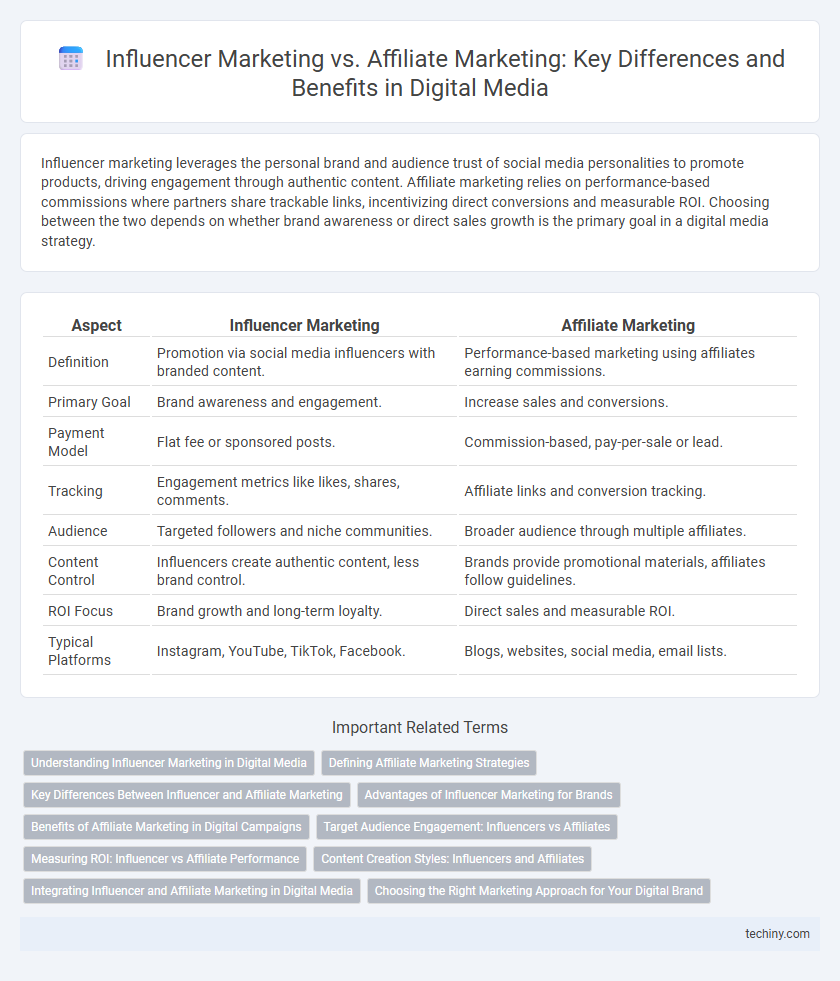Influencer marketing leverages the personal brand and audience trust of social media personalities to promote products, driving engagement through authentic content. Affiliate marketing relies on performance-based commissions where partners share trackable links, incentivizing direct conversions and measurable ROI. Choosing between the two depends on whether brand awareness or direct sales growth is the primary goal in a digital media strategy.
Table of Comparison
| Aspect | Influencer Marketing | Affiliate Marketing |
|---|---|---|
| Definition | Promotion via social media influencers with branded content. | Performance-based marketing using affiliates earning commissions. |
| Primary Goal | Brand awareness and engagement. | Increase sales and conversions. |
| Payment Model | Flat fee or sponsored posts. | Commission-based, pay-per-sale or lead. |
| Tracking | Engagement metrics like likes, shares, comments. | Affiliate links and conversion tracking. |
| Audience | Targeted followers and niche communities. | Broader audience through multiple affiliates. |
| Content Control | Influencers create authentic content, less brand control. | Brands provide promotional materials, affiliates follow guidelines. |
| ROI Focus | Brand growth and long-term loyalty. | Direct sales and measurable ROI. |
| Typical Platforms | Instagram, YouTube, TikTok, Facebook. | Blogs, websites, social media, email lists. |
Understanding Influencer Marketing in Digital Media
Influencer marketing in digital media leverages individuals with large, engaged followings to promote brands authentically, driving higher user trust and engagement compared to traditional advertising methods. Brands collaborate with influencers across social platforms like Instagram, YouTube, and TikTok to create targeted content that resonates with niche audiences. This strategy enhances brand visibility and conversion rates by utilizing influencer credibility and social proof in highly personalized marketing campaigns.
Defining Affiliate Marketing Strategies
Affiliate marketing strategies focus on leveraging partnerships where affiliates promote products or services in exchange for commissions based on performance metrics like sales or leads. These strategies involve selecting high-converting affiliates, optimizing tracking systems, and creating compelling promotional materials to maximize ROI. Understanding target audience behavior and integrating data-driven insights are crucial to refining campaign effectiveness within digital media.
Key Differences Between Influencer and Affiliate Marketing
Influencer marketing leverages individuals with strong social media followings to promote products through authentic content, emphasizing brand awareness and audience engagement. Affiliate marketing relies on performance-based commissions where affiliates drive sales via tracked links, focusing on measurable conversions and ROI. Key differences include influencer marketing's emphasis on reach and trust-building, while affiliate marketing prioritizes direct sales attribution and cost-effectiveness.
Advantages of Influencer Marketing for Brands
Influencer marketing offers brands enhanced authenticity and trust by leveraging influencers' established relationships with their audiences, resulting in higher engagement rates and more genuine brand connections. It enables precise targeting through niche influencers, increasing the likelihood of reaching specific consumer demographics effectively. Brands benefit from creative content generated by influencers, which can boost brand awareness and social proof across diverse digital platforms.
Benefits of Affiliate Marketing in Digital Campaigns
Affiliate marketing amplifies digital campaigns by leveraging a network of performance-driven partners who generate measurable ROI through cost-per-action models. This approach provides brands with scalable reach, precise audience targeting, and enhanced credibility via trusted affiliates promoting products authentically. Unlike influencer marketing, affiliate programs incentivize continuous sales growth, ensuring optimized budget allocation and long-term partnership benefits.
Target Audience Engagement: Influencers vs Affiliates
Influencer marketing drives higher target audience engagement through authentic content and personal connections, leveraging influencers' established trust and relatable personas. Affiliate marketing relies more on performance-based promotions, often appealing to niche audiences through targeted offers and incentives. Influencers tend to generate emotional engagement, while affiliates focus on direct conversion metrics and customer acquisition.
Measuring ROI: Influencer vs Affiliate Performance
Measuring ROI in influencer marketing involves tracking engagement metrics such as likes, shares, comments, and brand mentions, which reflect audience interaction and brand awareness impact. Affiliate marketing ROI measurement relies on direct attribution models, focusing on clicks, conversions, and sales generated through affiliate links, providing clear performance data and revenue impact. Influencer marketing offers qualitative brand value insights, while affiliate marketing delivers precise quantitative sales metrics, enabling distinct approaches to evaluating campaign effectiveness.
Content Creation Styles: Influencers and Affiliates
Influencers often create personalized, authentic content that showcases products through storytelling, lifestyle integration, and emotional appeal, fostering a strong connection with their audience. Affiliates primarily produce straightforward, informative content such as detailed reviews, tutorials, and comparison guides focused on product features and benefits, aimed at driving conversions. Both content creation styles leverage unique approaches to engage different segments of digital audiences effectively.
Integrating Influencer and Affiliate Marketing in Digital Media
Integrating influencer marketing and affiliate marketing in digital media leverages the unique strengths of both strategies to maximize brand reach and conversion rates. Influencers build authentic connections with their audience, driving engagement through trusted content, while affiliate marketing incentivizes performance by offering commissions on sales. Combining these approaches enhances tracking capabilities, optimizes ROI, and creates scalable campaigns that benefit from genuine influencer-driven promotion alongside measurable affiliate outcomes.
Choosing the Right Marketing Approach for Your Digital Brand
Influencer marketing leverages social media personalities to create authentic content that drives brand awareness and engages targeted audiences, while affiliate marketing focuses on performance-based partnerships where affiliates earn commissions on sales generated. Selecting the right approach depends on your digital brand's goals, whether prioritizing broad audience reach and storytelling or tracking direct conversions and ROI. Analyzing metrics such as engagement rates, cost per acquisition, and conversion tracking helps optimize campaign effectiveness and maximize marketing investment.
Influencer Marketing vs Affiliate Marketing Infographic

 techiny.com
techiny.com